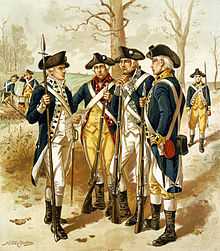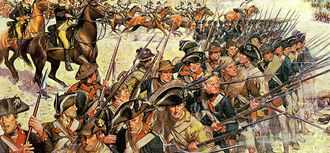The Continental army was lead by George Washington. The army was ragtag, barely trained, half-starving and woefully unequipped. The group was also hardly united for too much of the war and led by generals often squabbling, undermining, or fighting with each other. The victories, while qualified, are remarkable in this light. The regular Continental Army was a force in development. By the end of the war, certain units achieved a near parity with some few British units in terms of training, battlefield capability and march rates. But those were few and far between. All in all, the non-militia forces were adequate at times in later battles, but generally were out-fought by superior British units.

In terms of manpower - variable ranging from a nearly 2–1 superiority at times to less than 30% (winter months). In terms of quality of training, sometimes highly variable - ranging from adequate to extremely poor. In terms of supplies and heavy weapons - usually very poor. Despite these various problems and disadvantages, Washington led an army that defeated the world's premier war machine of its day. Historians have praised Washington for his choice and supervision of the generals, how he encouraged morale, and held together the army. His close coordination with governors and state militias, his cooperative relations with Congress, and his professional attention to supplies, logistics, and training all contributed to the success of the Continental Army.

Lost in the local color of this operation is this is a standard operation by ANY pre-20th century force when opposed at a local crossing point - maintain contact and flank with a small highly mobile force and continue the line of march. This is exactly what the professional British force did. The local militia in this case was simply a nuisance, easily dispatched and overcome. Yet it has gone down in American history as a local triumph, so much so that the NBA team is known as the “Hornets” in reference to this event.


